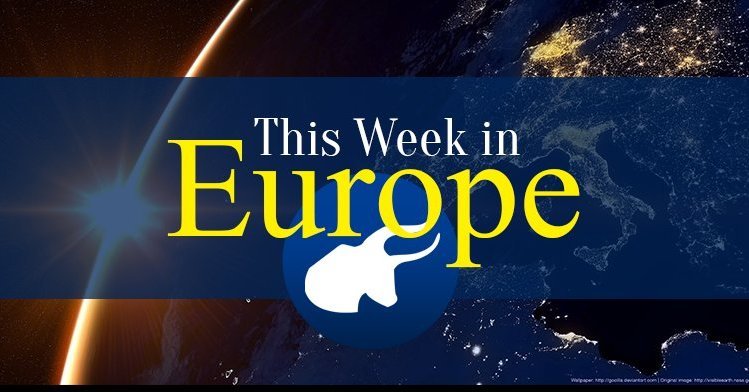Macedonian parliament approves country name change
On Friday, the parliament of the Former Yugoslav Republic of Macedonia approved a proposal to change the country’s name into the Republic of North Macedonia in order to bring its prolonged dispute with Greece to an end. With 80 deputies in favor out of the 120 total, the vote reached the necessary two-thirds majority. Mending ties with Greece means that a renamed Macedonia could become part of NATO and the EU, as Greece had been blocking any talk of accession previously, arguing that the name “Macedonia” implied territorial claims into its own sovereign borders. However, the process is still not complete - a referendum in Macedonia on the agreement failed to meet the necessary 50% turnout threshold. The Greek parliament will also have to vote on the deal, which might prove tricky as well. Macedonian PM Zoran Zaev, however, is hopeful for the future.
700,000 Brits call for a second referendum on Brexit
On Saturday, an estimated 700,000 people participated to the People’s Vote rally in London. They called for a new vote on Brexit and argued that British PM Theresa May is negotiating a poor deal with the Union. While May, as PM and leader of the Conservative party, has denied the possibility of another referendum, the Labour Party has not - despite the lack of clear signals from its leadership. Celebrities addressed the crowd on Saturday, but also the Labour-affiliated London mayor, Sadiq Khan, who argued that the Brexit matter was too important to be left in the hands of politicians, and that the people must be heard.
ECJ orders Poland to stop changes to the judiciary
On Friday, the European Court of Justice ordered Poland to suspend changes and “reforms” to the Polish Supreme Court immediately. The country’s government had been lowering the retirement age of judges, thus pushing many of them into early retirement, thus undermining the rule of law. Moreover, those judges who want to stay on the Court past the age of 65 are supposed to ask special permission from the Polish president, Andrzej Duda. Back in August, Poland addressed the ECJ, asking if the move was actually breaking EU rules. In the meantime, however, they pushed onward with the process. Now, the ECJ’s order freezes all actions by the government and turns back the time to before the time in which the new law entered into force, in April. However, in the last few months, Polish officials have been saying that ECJ ruling do not have to be followed. Back in December, the Commission launched the Article 7 proceedings against Poland, which could end with the country losing its voting rights in the EU.
Greens score big in Belgium and Germany
Last Sunday, the Greens, along with the leftists and the far-right, registered high scores in the local elections in Belgium. In the 19 communes of Brussels, the Green party replaced the ruling socialist party and the right-wing MR, coming first or second in several local councils. The leftist PTB party, along with the far-right Vlaams Belang, also saw improvements in their own scores across Belgium, in Flanders, Wallonia and around Brussels. Overall, Belgian traditional parties lost seats in favor of the Greens, leftists and far-right.
In Germany’s region of Bavaria, last Sunday’s state elections also represented a moment of victory for the Green Party. The environmentalists ended the prolonged domination of the conservative CSU (Angela Merkel’s allies) and became the second strongest political force. With 35.6% of the votes, the CSU remained on top in Bavaria, but lost 12.1% compared to the last elections. At the same time, the Bavarian Green party reached a remarkable 18.3% in Bavaria, followed by the independent Free Voters and the far-right Alternative for Germany, with 11%. Tough talks are expected between the parties, with the CSU seeking to form a coalition with the Free Voters in order to obtain majority.
Police raids home of Jean-Luc Mélenchon
On Tuesday, French police raided the home of left-wing populist politician Jean-Luc Melenchonan due to allegation of misuse of funds by his party, France Unbowed. The party allegedly paid assistants with money from the European Parliament but kept them working for the party’s national office, drawing the attention of the French anti-corruption office OCLCIFF. On a series of broadcasts of Facebook, the left-wing leader denounced the raids as politically motivated and blamed the government for suppressing its opposition, calling out president Emmanuel Macron by name. While Melenchon and his followers blame the justice ministry for the raids, the ministry argued that it was the Paris prosecutor’s office organizing the investigation. Several computers, mobile phones and memory sticks were confiscated as part of the raids. During the last presidential elections in France, Melenchon gathered about a fifth of the votes in the first round, being popular among young people in particular. After the first round of voting, he opposed far-right candidate Marine Le Pen but refused to endorse Emmanuel Macron.
Russian Orthodox Church breaks ties with Constantinople
On Monday, an enraged Russian Orthodox Church broke all its ties with the Holy Synod of the Patriarchate of Constantinople, the worldwide leadership of Orthodox Christianity, after it granted independence to the Ukrainian Orthodox Church and reinstated bishops and church members who had been excommunicated by Moscow. Russia has been controlling the Ukrainian church for more than 300 years, and early half of all Orthodox believers are Russian, so the break could have long-lasting effects, comparable to the Great Schism of 1054 that divided Catholicism and Eastern Orthodoxy.
Spain and Flanders clash
A diplomatic row has occurred between Spanish and Flemish representatives after the president fo the Flemish parliament, Jan Peumans, stated support for the separatist movement in Catalonia. The Flemish representative in Madrid was stripped of diplomatic status in retaliation for these comments. In return the Minister-President of Flanders, Geert Bourgeois, declared that he would summon Spain’s ambassador. Peumans has previously been outspoken in his attacks on Spain and declared that the Spanish government could not be part of a democratic European Union following the events of the illegal referendum on Catalan independence. The Catalan regional government has criticised Madrid’s handling of the dispute.
Nationalist fractures on Italy-Austria border
There is a growing dispute between nationalists in the Austrian and Italian governments. Though the two see eye-to-eye on many European issues, they are getting increasingly frustrated with one another over the status of the South Tyrol region. Formerly part of the Austrian Empire and then annexed by Italy after World War One, the region is still majority German-speaking and the far-right Austrian Freedom Party (FPO) wants these citizens to be able to gain Austrian citizenship as well as Italian. Though there does not appear to be much demand for greater attachment to Austria in the region, it is a great desire of Austrian nationalists, much to the anger of the Italian nationalist government who see it as an attack on Italy’s territorial integrity.
New €100 million innovation fund
Bill Gates, the former CEO of Microsoft, has signed a Memorandum of Understanding with the European Commission to establish a joint fund - “Breakthrough Energy Europe”. The fund is aimed at supporting innovative projects that develop new and better clean energy technologies. Gates is already involved with a much bigger fund with a similar mission, called Breakthrough Energy Ventures (BEV) but has agreed to this new fund in order to move away from the US-centric nature of BEV. As well as clean energy production, storage for such energy has been cited as the “holy grail” by the European Commission. The hope is that this fund will be able to invest in riskier projects than can be justified with traditional public investment funds, while taking faster decisions.


Follow the comments: |
|
